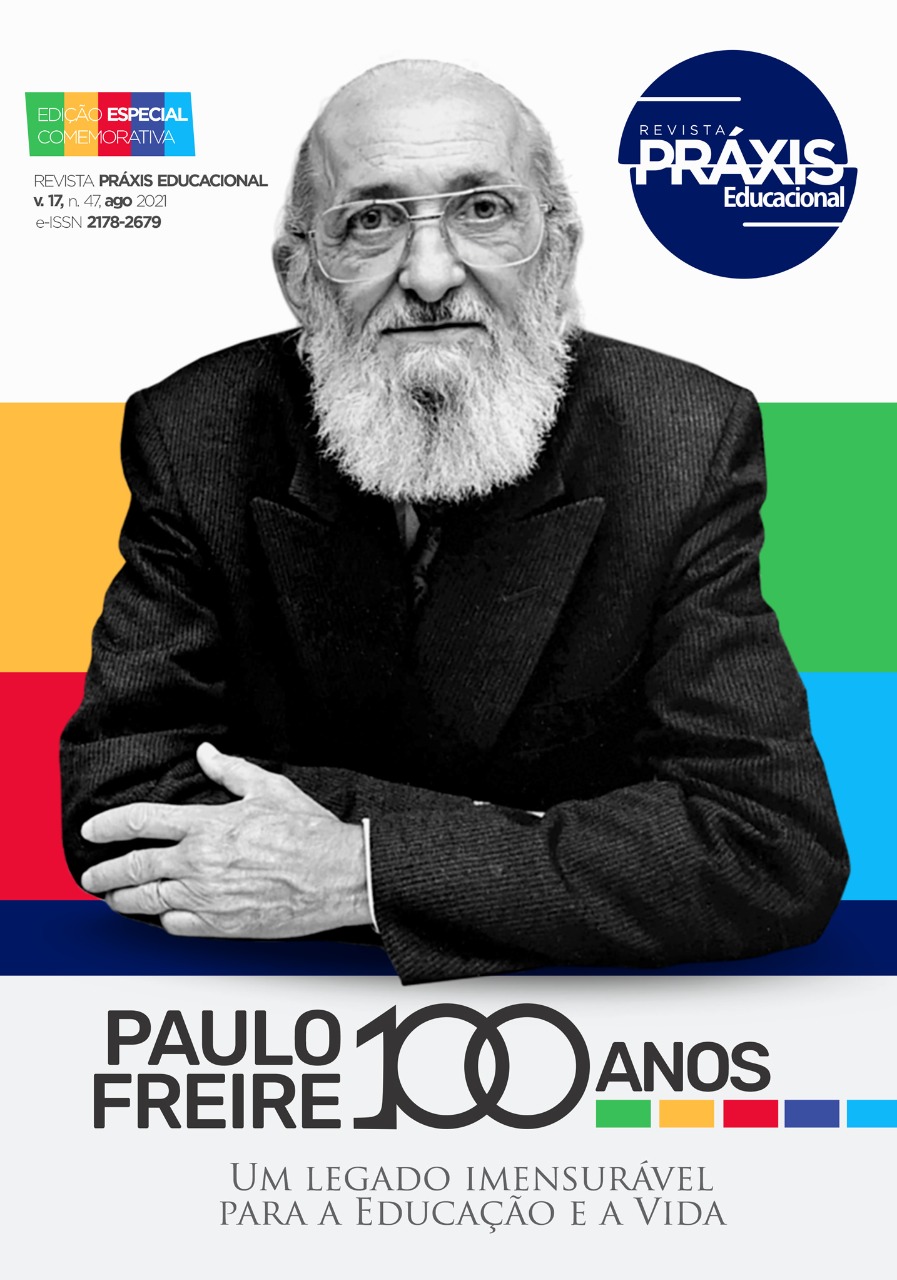Un legado global del trabajo freirean: un diálogo con Peter Roberts
DOI:
https://doi.org/10.22481/praxisedu.v17i47.9384Palabras clave:
Diálogo, Freire, Legado freireanoResumen
En la fase de las discusiones propuestas y esperadas para el debate sobre el pensamiento de Freire con motivo del centenario de su nacimiento, este texto buscó entablar un diálogo con uno de los investigadores que, a lo largo de décadas, ha constituido todo un conjunto científico, académico y itinerario social., teniendo como uno de los aportes de reflexión la obra del maestro brasileño Paulo Freire. Así, se realizó una entrevista al profesor Peter Roberts, cuya producción ha traspasado fronteras y ha ampliado la discusión con y del pensamiento de Freire. Peter Roberts es profesor en la Universidad de Canterbury, Christchurch, Nueva Zelanda, en el campo de la educación. El objetivo de la entrevista, por tanto, era destacar el trabajo de Paulo Freire en el foco de trabajos académicos realizados por el profesor Peter Roberts, ya sea estableciendo puentes dialógicos entre Freire y otros autores, o buscando nuevos caminos que actualicen el pensamiento de Freire.
Descargas
Métricas
Citas
Barreto, L. (2011). Triste fim de Policarpo Quaresma / The sad end of Policarpo Quaresma (M. Carlyon, Trans.). Rio de Janeiro: Instituto Cultural Cidade Viva.
Darder, A. (2015). Freire and education. New York: Routledge.
Escobar, M., Fernandez, A.L., Guevara-Niebla, G. with Freire, P. (1994). Paulo Freire on higher education: A dialogue at the National University of Mexico. Albany, NY: State University of New York Press.
Freire, P. (1972a). Pedagogy of the oppressed. Harmondsworth: Penguin.
Freire, P. (1972b). Cultural action for freedom. Harmondsworth: Penguin.
Freire, P. (1976). Education: The practice of freedom. London: Writers and Readers.
Freire, P. (1993). Pedagogy of the city. New York: Continuum.
Freire, P. (1994). Pedagogy of hope. New York: Continuum.
Freire, P. (1996). Letters to Cristina: Reflections on my life and work. London: Routledge.
Freire, P. (1997). Pedagogy of the heart. New York: Continuum.
Freire, P. (1998a). Teachers as cultural workers: Letters to those who dare teach. Boulder, CO: Westview Press.
Freire, P. (1998b). Pedagogy of freedom: Ethics, democracy, and civic courage. Lanham, Maryland: Rowman and Littlefield.
Freire, P. (1998c). Politics and education. Los Angeles, CA: UCLA Latin American Center Publications.
Freire, P. (2004). Pedagogy of indignation. Boulder, CO: Paradigm Publishers.
Freire, P. (2007). Daring to dream. Boulder, CO: Paradigm Publishers.
Freire, P. & Faundez, A. (1989). Learning to question: A pedagogy of liberation. Geneva: World Council of Churches.
Freire, P., Freire, A.M.A., & de Oliviera, W.F. (2014). Pedagogy of solidarity. Walnut Cove, CA: Left Coast Press.
Freire, P. & Macedo, D. (1987). Literacy: Reading the word and the world. London: Routledge.
Freire, P. & Shor, I. (1987). A pedagogy for liberation. London: MacMillan.
Horton, M. & Freire, P. (1990). We make the road by walking: Conversations on education and social change. Philadelphia, PA: Temple University Press.
Kirylo, J.D. (2011). Paulo Freire: The man from Recife. New York: Peter Lang
Kirylo, J. (Ed.) (2020). Reinventing Pedagogy of the Oppressed: Contemporary critical perspectives. London: Bloomsbury.
Mayo, P. (1999). Gramsci, Freire and adult education: Possibilities for transformative action. London: Zed Books.
Morrow, R.A. & Torres, C.A. (2002). Reading Freire and Habermas: Critical pedagogy and transformative social change. New York: Teachers College Press.
Peters, M.A. & Besley, T. (Eds.) (2015). Paulo Freire: The global legacy. New York: Peter Lang.
Roberts, P. (Ed.) (1999). Paulo Freire, politics and pedagogy: Reflections from Aotearoa-New Zealand. Dunmore Press: Palmerston North.
Roberts, P. (2000). Education, literacy, and humanization: Exploring the work of Paulo Freire. Westport, CT: Bergin and Garvey.
Roberts, P. (2010). Paulo Freire in the 21st century: Education, dialogue and transformation. Boulder, CO: Paradigm Publishers.
Roberts, P. (2012). From West to East and back again: An educational reading of Hermann Hesse’s later work. Rotterdam: Sense Publishers.
Roberts, P. (Ed.) (2015). Shifting focus: Strangers and strangeness in literature and education. New York: Routledge.
Roberts, P. (2016). Happiness, hope, and despair: Rethinking the role of education. New York: Peter Lang.
Roberts, P. (2019). Thesis supervision: A Freirean approach. In C.A. Torres (Ed.) The Wiley Handbook of Paulo Freire (pp. 521-534). Oxford: Wiley-Blackwell.
Roberts, P. (2020). Less certain but no less committed: Paulo Freire and Simone de Beauvoir on ethics and education. In J.D. Kirylo (Ed.) Reinventing Pedagogy of the Oppressed: Contemporary critical perspectives (pp. 135-146). London: Bloomsbury.
Roberts, P. (2021). Conscientization, compassion and madness: Freire, Barreto and the limits of education. Review of Education, Pedagogy, and Cultural Studies, 1-21. Available online at: https://doi.org/10.1080/10714413.2021.1890510
Roberts, P. & Freeman-Moir, J. (2013). Better worlds: Education, art, and utopia. Lanham, MD: Lexington Books.
Roberts, P. Gibbons, A. & Heraud, R. (2015). Education, ethics and existence: Camus and the human condition. New York: Routledge.
Roberts, P. & Saeverot, H. (2018). Education and the limits of reason: Reading Dostoevsky, Tolstoy and Nabokov. New York: Routledge.
Schugurensky, D. (2011). Paulo Freire. London: Continuum.
Smith, G. (1999). Paulo Freire: Lessons in transformative praxis. In P. Roberts (Ed.) Paulo Freire, politics and pedagogy: Reflections from Aotearoa-New Zealand. Dunmore Press: Palmerston North.
Torres, C.A. (Ed.) (2019). The Wiley Handbook of Paulo Freire. Oxford: Wiley-Blackwell.
Descargas
Publicado
Cómo citar
Número
Sección
Licencia

Esta obra está bajo una licencia internacional Creative Commons Atribución-CompartirIgual 4.0.
Usted es libre de:
Compartir — copiar y redistribuir el material en cualquier medio o formato; Adaptar — remezclar, transformar y construir a partir del material para cualquier propósito, incluso comercialmente. Esta licencia es aceptable para Obras Culturales Libres. La licenciante no puede revocar estas libertades en tanto usted siga los términos de la licencia.
Bajo los siguientes términos:
Atribución — Usted debe dar crédito de manera adecuada, brindar un enlace a la licencia, e indicar si se han realizado cambios. Puede hacerlo en cualquier forma razonable, pero no de forma tal que sugiera que usted o su uso tienen el apoyo de la licenciante.
No hay restricciones adicionales — No puede aplicar términos legales ni medidas tecnológicas que restrinjan legalmente a otras a hacer cualquier uso permitido por la licencia.










